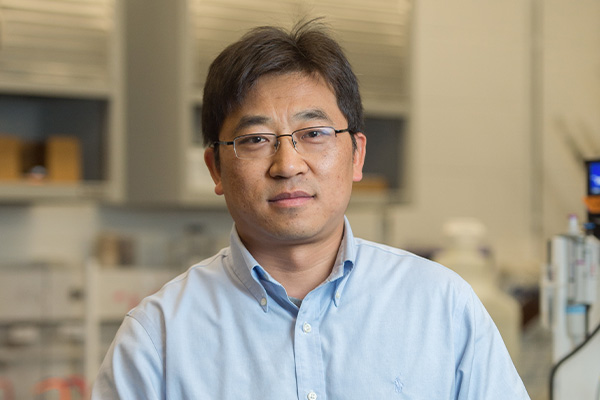Wu joins Energy, Environmental & Chemical Engineering faculty
Highly regarded researcher Gang Wu specializes in new hydrogen technology

Gang Wu, a highly regarded scholar in electrochemical engineering and hydrogen technology, has joined the Department of Energy, Environmental & Chemical Engineering in the McKelvey School of Engineering at Washington University in St. Louis. Wu’s recruitment was supported by the Here and Next Field Leading Faculty Initiative.
Wu joins McKelvey Engineering as a professor from The State University of New York at Buffalo, where he had been on the faculty since 2014. During that decade, his group was awarded more than $10 million in grants from federal agencies for projects related to developing advanced materials for electrochemical energy conversion and storage technologies. He also was the author of more than 330 scientific papers and nine book chapters and holds 12 patents or patent applications. His work has earned more than 56,000 citations by August 2024, allowing him to be named as a Highly Cited Researcher by Clarivate Analytics since 2018. He has won numerous awards and honors for his research.
An electrochemist, Wu is a leading scientist in exploring platinum group metal (PGM)-free and low-PGM catalysts for sustainable hydrogen technologies, such as fuel cells, water electrolysis, carbon dioxide conversion and clean electrosynthesis. In 2011, he published his pioneering work in Science as the first author and demonstrated the feasibility of using PGM-free catalysts to replace platinum for fuel cell technologies. After that, as the principal investigator, he further expanded the concept of a series of fuel cell catalysts based on atomically dispersed metal sites.
In 2023, Wu received $3 million from the U.S. Department of Energy (DOE) to develop a catalyst for a hydrogen fuel cell that is efficient, cheap and durable — something he has been working on for more than 18 years. The award is part of Hydrogen Shot, a DOE initiative to tap hydrogen as an efficient, affordable fuel and achieve net-zero carbon emissions by 2050.
In addition, Wu is working on other research projects funded by the DOE, including a $600,000 subaward led by General Motors that focuses on regulating carbon structures for new catalysts for hydrogen-powered vehicles; a $750,000 subaward led by Carnegie Mellon University to develop different fuel cell catalysts for hydrogen fuel cells in heavy-duty vehicle applications; and a $750,000 subaward led by PlugPower for innovative catalysts for water electrolyzers for clean hydrogen generation.
